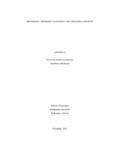
Please use this identifier to cite or link to this item:
https://hdl.handle.net/20.500.14301/415| Title: | Reform in university system in the changing context |
| Authors: | Sharma, Tanka Nath Bhattarai, Prakash C Gautam, Suresh |
| Citation: | Sharma, T.N., Bhattarai, P.C. & Gautam, S. (2011). University reform in changing context. Kathmandu University School of Education. |
| Issue Date: | Nov-2011 |
| Publisher: | Kathmandu University School of Education |
| School: | SOED |
| Abstract: | The contemporary higher education of Nepal has come across the tremendous challenges and problems which hardly address the social, political and economical issues of the country. This research used mixed methods. The quantitative part of the study was substantiated by the qualitative study, too. The central offices and campuses of the five universities (Kathmandu University, Tribhuwan University, Pokhara University, Nepal Sanskrit University and Purbanchal University) were the study sites. Managers/staffs, faculties, administrators and students were participants of the research. Qualitative and quantitative approaches were used to analyze and interpret the data. Universities of Nepal are expected to be knowledge centers, which aim at opening the academic avenues for the students. Therefore, the role of the university in Nepal is more concerned to knowledge production. University curriculum has partly focused on research based activities linked to the knowledge production and management in the university. The knowledge gained from universities has limited links with the society and industries of the country. Under such circumstances, universities are expected attempt to respond to the emerging needs of the labor market. In the same way, universities have hardly addressed the social, political and economic issues of the country. Similarly, universities have hardly maintained the harmonious relationship among the students, authorities, faculties and administrators. The relationship among these stakeholders has been affected because of political parties' interferences. However, there are some institutions within the university system which are producing impressive results. The major administrative bodies of universities are appointed by the governments guided by their political ideology rather than professional skills and academic abilities. This situation has created the messy academic environment in the universities. Likewise, the resource generation in the universities was one of the challenges to be addressed in the changing context. Curriculum and evaluation systems in Nepalese universities have not been revised in accordance with the changing speed of time. Revision of higher education policy addressing the national and international trend of the higher education in Nepal is another issue to be addressed as raising agendas of university reform. |
| URI: | https://hdl.handle.net/20.500.14301/415 |
| Appears in Collections: | Reports |
Files in This Item:
| File | Description | Size | Format | |
|---|---|---|---|---|
| Uni Reform@UGC 8 dec 2011.pdf | 1.84 MB | Adobe PDF |  View/Open |
Items in DSpace are protected by copyright, with all rights reserved, unless otherwise indicated.